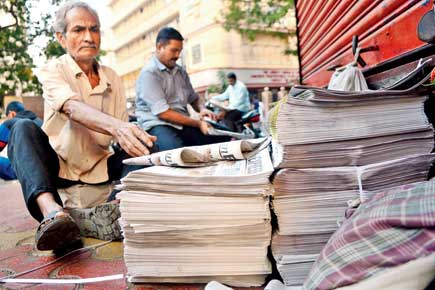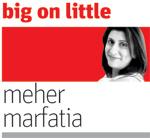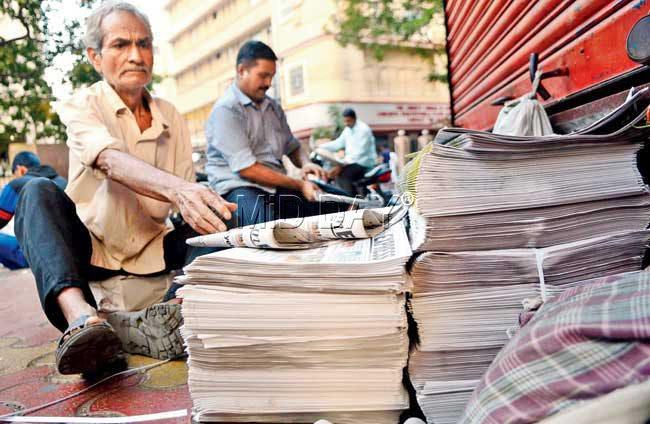“I read your story at 5 in the morning,” urban historian Deepak Rao declares. I’m impressed

Bhupendra Upadhyay
 “I read your story at 5 in the morning,” urban historian Deepak Rao declares. I’m impressed. Because this isn’t online, it’s in the stash of dailies dropped at his door. He doesn’t think that it’s a remarkably early hour for the printed word to pile at his feet. Neither, it seems, does his paperwallah — whose family probably introduced home delivery of newspapers in the city.
“I read your story at 5 in the morning,” urban historian Deepak Rao declares. I’m impressed. Because this isn’t online, it’s in the stash of dailies dropped at his door. He doesn’t think that it’s a remarkably early hour for the printed word to pile at his feet. Neither, it seems, does his paperwallah — whose family probably introduced home delivery of newspapers in the city.
ADVERTISEMENT
I’m keen to meet 69-year-old Bhupendra Upadhyay. Seized by the spirit of enterprise, his father Ram Kishore in 1939-40 had boldly gone knocking on doors of art deco homes freshly built to face train tracks along Queens Road, Churchgate. Residents just moved in welcomed the novel service offered. Until then people picked publications from AH Wheeler or kerbside vendor kiosks.
It was a lone, long trek from the fields of Bisalpur in Uttar Pradesh to the streets of wartime Bombay. An idea risked by the simple farmer in his twenties paid off. “Dadaji showed courage setting off on that journey from our small village those days,” says Rakesh, the pioneer’s 42-year-old grandson. I sit with Bhupendra and Rakesh to be treated to the fascinating tale of their continuing ancestral trade.

Bhupendra Upadhyay and his son Rakesh setting up their newspaper display at New Marine Lines. Pic/Bipin Kokate
Not far from his rented room near the GPO, Ram Kishore first helped at a little paper stall on a wall of Jer Mahal in Dhobi Talao. He dreamt of a bigger business beat of his own, fanning out from Metro cinema. The Ditchburn & Mistri-designed movie hall rose in 1939, the same year he struck work. Metro to New Marine Lines to Oval Maidan, he sensed profit in pricing a 12 paise Times of India edition at 16 paise if brought to homes at the dot of dawn. Eight years on, another iconic theatre sprang up bang in the middle of his route, named Liberty for the sweet scent of freedom in the air of 1947 when it opened.
Papers stacked underarm (a bicycle unaffordable), Ram Kishore ran on his rounds along paths which proved Parsi and Catholic strongholds. They called for the Bombay Chronicle, Bombay Sentinel, Free Press Journal or Illustrated Weekly of India. “It was prestigious for a family to have an English magazine and a radio!” laughs Bhupendra.
Each household subscribed to some “Angrezi akhbaar”, unlike the trend of one Navakaal copy shared by 20 readers. Ram Kishore felt proud supplying Tilak’s Kesari and Maratha to regulars. Gujarati being the mother tongue of many communities in those areas, the Mumbai Samachar and Jam-e-Jamshed enjoyed high circulation. “A very good paper, Midday came afterwards,” Rakesh adds.
If Bhupendra joined his father on the job in 1964, Rakesh tagged on in 1990 and Ram Kishore died in 1995. They followed the patriarch’s pair of rules: The customer is king. Keep your distance, no entering beyond a front door. “In our experience Parsis are kindest, always preparing hisaab to pay paper bills by the 1st of the month,” Rakesh says.
The Upadhyays personally hand West End Hotel clients and Bombay Hospital patients their favourite reads. Celebrities bumped into include Anil Kapoor popping in to cheer a recovering Shabana Azmi — “She bought two of five magazines I showed her,” Rakesh remembers. He beams broadest describing a chance encounter with Ratan Tata. “Saab was visiting a lady there. I tapped on the room door. He stepped out quietly to not disturb her. I was thrilled to recognise him from newspaper photos.”
Father and son head out at 4 am for the distribution centre behind Empire cinema to greet a line of tempos carrying papers from the printers. Home trips done by 8, they display the rest of their stock on the pavement corner outside the chemist opposite Liberty. Liftmen, watchmen and taxi drivers come collecting the Navbharat Times, Yashobhoomi and Dabang Duniya. The Upadhyays can take no more than five press holidays in the year. And what is their future in the digital age? “Yeh Internet theek hain, phir bhi papers will be here longer than you think,” Bhupendra claims with confidence.
“Our deliveries are never delayed,” smiles Rakesh. “Only the Marathon morning closed roads make us slightly late. Like last month. You won’t hear of it happening again till January 2016. It’s a matter of honour.”
Meher Marfatia loves Mumbai. And adores Bombay.
Reach her on: mehermarfatia@gmail.com
 Subscribe today by clicking the link and stay updated with the latest news!" Click here!
Subscribe today by clicking the link and stay updated with the latest news!" Click here!









